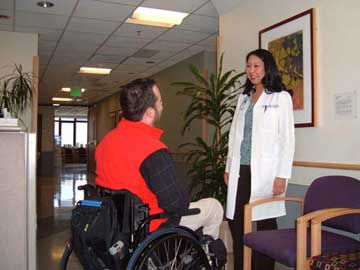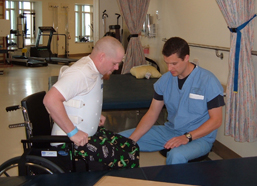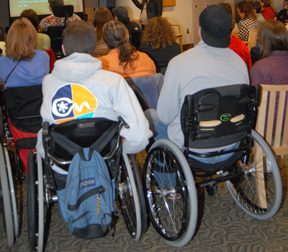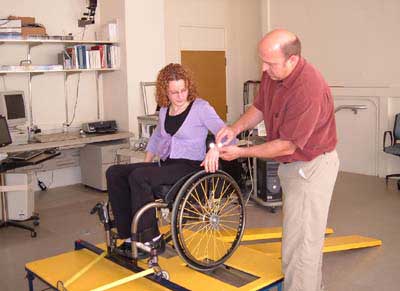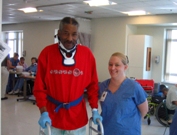Treating SCI Pain with Relaxation and Hypnosis: A UW Study
Chronic pain is a serious, debilitating problem for many persons with spinal cord injury. It can interfere significantly with daily life and is often unresponsive to conventional pain treatments. Mark Jensen, PhD, professor in the Department of Rehabilitation Medicine at the University of Washington and an expert in the field of pain and disability, is conducting a five-year study, funded by the National Institutes of Health, to test the effectiveness of two different relaxation treatments for SCI pain.
"We really want to expand the treatment options for persons with SCI-related pain because we know the treatments we have available now are not very effective," Jensen said. "Medications are not always helpful and often have adverse or intolerable side effects."
"In contrast, hypnosis and relaxation techniques are a way to get pain relief that has only positive side effects, such as improved sleep, lowered blood pressure and decreased anxiety."
The two treatments under investigation in this study both contain hypnosis and relaxation training components. One focuses on direct verbal suggestions for relaxation; the other uses biofeedback-assisted relaxation. "Patients report they feel better after both treatments, and each has been shown to be effective for chronic pain in other populations," Jensen said.
Jensen explains the effect of deep relaxation by comparing the brain to a television set: "You can only listen to one or two channels at a time. Yet there are potentially thousands of channels of information available to our brains. We can't process all the possible input that our brains receive. In a deeply relaxed state, the mind simply has more control over how we process information. People can learn to filter out unpleasant pain sensations, and we think relaxation helps to facilitate this."
"Also, it's hard to hurt so much when you're deeply relaxed," he added.
Jensen and his colleagues are recruiting up to 134 participants who have SCI at any level and who experience bothersome chronic pain. Participants can have neuropathic pain-caused by abnormal processing of sensory input due to damage to the nervous system-or musculoskeletal pain-due to overuse of non-paralyzed muscles, as in wheelchair propulsion. Most people with SCI have a combination of both types of pain, says Jensen. "One of our research questions is whether these treatments are effective for different kinds and combinations of pain."
Participation involves an initial interview; a physical exam by the study physician (Dr. Diana Cardenas); a two-month "baseline" period (before beginning treatment) of daily pain ratings; random assignment to one of two relaxation treatment groups; 10 free one-hour relaxation training sessions over a two- to four-week period; and monthly follow-up phone interviews for one year after treatment. Participants will receive free parking, free treatment sessions with a research psychologist (which normally costs $120 per session), and compensation for follow-up interviews.
Participants in the study so far report significant benefit from the relaxation training, Jensen says. Because relaxation is something people can learn to do for themselves, it can give them a sense of control over pain. Many participants have been surprised at the effectiveness of the techniques-for some, this was the first time in years they felt pain-free. Some said the procedures eliminated their pain; others that it helped make their pain more tolerable. A number of participants commented that it was a good way to decrease anxiety and get through tough times. It also improved sleep for many.
"These techniques don't relieve pain for everybody, but some people get significant pain relief and most report at least a little," Jensen noted. Furthermore, "relaxation is a good stress-management skill." Finally, many research participants like knowing they are contributing to research that will help others in the future.
For more information about participating in this study, contact Amy Hoffman, 206-616-9058 or 800-377-9707 ; painstudy@u.washington.edu (confidentiality of information sent via email cannot be guaranteed).

Sybil Bailey (right) is a participant in the research study "Relaxation and Hypnotic Treatment of Persons with Spinal Cord Injury-Related Pain." She is seen here during a training session with Joyce Engel-Knowles, PhD (left), associate professor in the Department of Rehabilitation Medicine and one of the study investigators.

